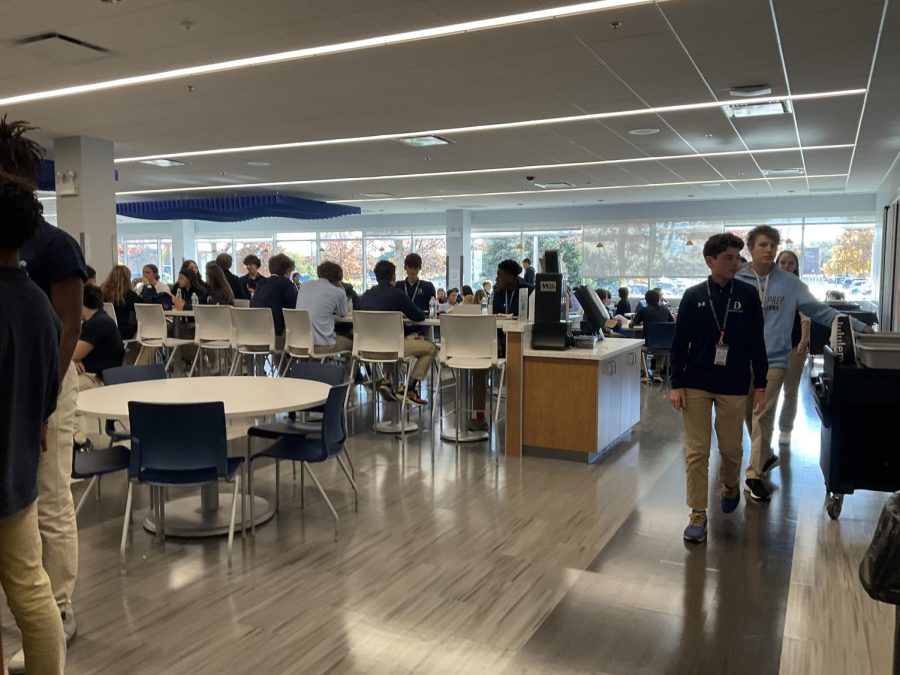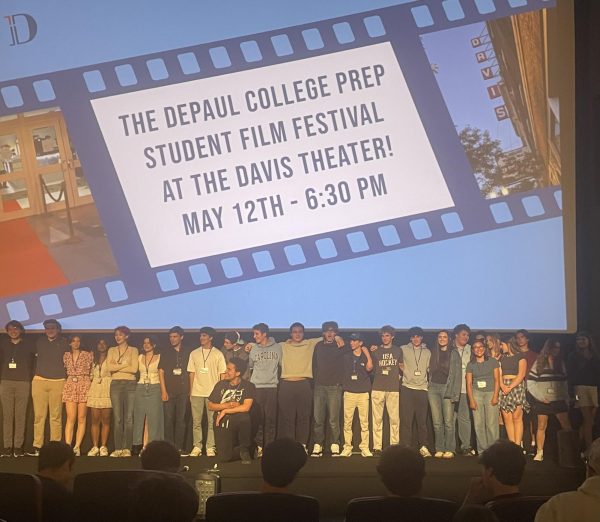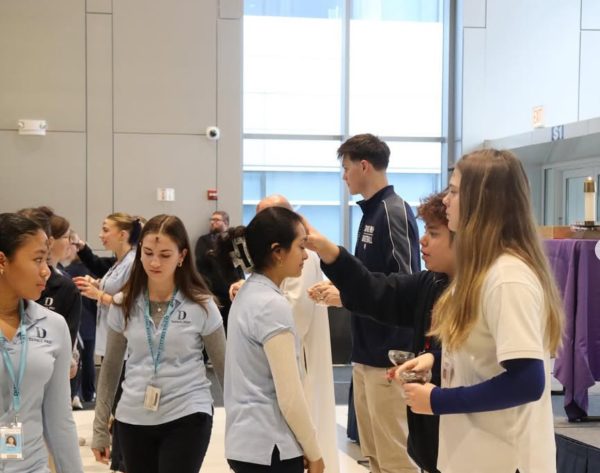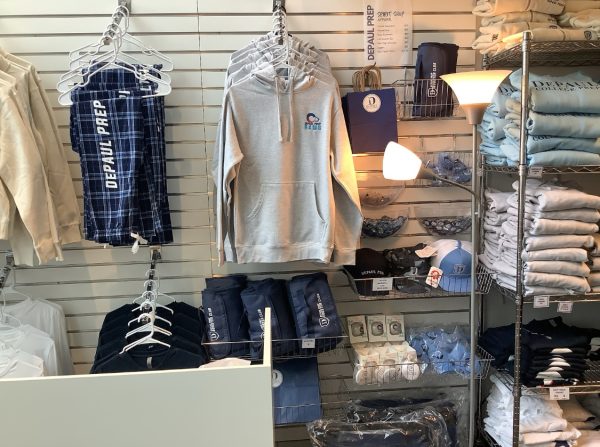Behind the scenes of Quest: What determines lunch food prices?
Since DePaul Prep students are not allowed to go off campus for lunch, meals are provided by Quest Food and Management Services. They serve a variety of meals but the most popular meals are French fries and anything with chicken such as chicken tenders, popcorn chicken, chicken nuggets, and wing toss. “If you break it up into three areas, you have the meat area where we’re serving you, the grill area where it’s hot grab n go, and then you have the cold area of grab n go sandwiches, the grill area is by far the most popular and any type of chicken the comes out of the deep fryer is very popular,” said Will Plamondon, executive chef at DePaul Prep.
Terese Williamson is the food service director and has been working at DePaul Prep for two years. When asked if any of the food’s popularity has changed, she noticed that this year, “there are a lot less grab n go salads and more hot items. The sushi is also very popular for the first two weeks and then it dies down.” Even though it’s still early in the school year, the student body really wants Taco Tuesdays, they don’t want a burrito bowl or any other variation of food. “Most of the other things that we’ve seen are a result of trying to give the student body what they want,” said Plamondon.
Both Terese and Will set the meal prices. It differs by the school, but it is also based on what they call “food cost”. DePaul is run similar to a restaurant, which is different from many schools such as Dominican University (Plamondon’s previous school), where there is a meal plan for students. “You get a little more flexibility because you know how many students there are, so you know what the dollars are, but if you were at one of our public schools, then the dietary and pricing requirements from the federal government would impact those things,” said Plamondon. They are trying to match the availability of food to restaurants such as Starbucks or Jimmy John’s.
Taylor Beck is a sophomore at DePaul who buys the school lunches. Her favorites are the Mac n Cheese and the chicken sandwiches. Taylor said that “everything is so expensive for no reason. I understand that they have to make their money somehow, but last year, the prices were a lot lower. It’s so ridiculous.” After hearing that the prices are what they are due to inflation, costs to make the product, as well as the cost to buy ingredients for the product, Beck said, “I’m still saying that they’re high and understand that they’re high because of inflation, but I don’t think that there’s ever going to be a reason that they will lower it.” When it comes to choosing a lower cost product that’s unheard of or a more expensive product that’s recognizable, Taylor would choose the lower brand to give it a try and because it’s cheaper.
There are many factors that the Quest Food workers take into consideration when it comes to determining the prices. They consider the cost of the product that’s being brought into the building, the cost of the labor to make the product, and the cost of the containers that they serve the product in. For example, if the company buys a lot of plates, as long as students don’t accidentally throw them in the garbage, the plates are reusable. They have to be more conscientious when it comes to the disposable containers. “If you see what I call the paper plates, they are more biodegradable, where the plastic is better for the food quality, but not better for the environment,” said Plamondon. He is hoping that as things evolve, the cafeteria can use more reusable dishes and reduce the amount of disposable dishes. This will hopefully change when the new wing is built and DePaul will have a third dining area. If they can get more reusable dishes and utensils, then it will benefit the cost as well as the environment.
Quest constantly monitors the cost of the food but doesn’t want the students to feel that the prices are always changing. If the price of potatoes is high, and Quest serves French fries at $3.25, what works best for the cost is to serve 4 ounces of fries. If the price of fries goes down, rather than adjust the price, they would serve an extra ounce of fries. There is the most price flexibility when it comes to ordering things.
Quest uses a term called “The Blend.” To help explain the blend better, Plamondon used water as an example. Last year, DePaul served Aquafina and Dasani and because they are name brand waters, the student body was able to recognize them. Based on the school’s budget, Quest sells them at a particular price. They would sell the water at a certain price to cover their cost. If they can find a water bottle that’s the same size, but 50 cents less per bottle, they can charge much less. It then becomes up to the student to decide which water bottle to buy. Plamondon said that “the hard part for us is to explain to the student body that if you take a moment to process, then you could make the educated decision. So often you would say ‘that’s the one I drink at home, that’s the one I recognize, so that’s the one I’m going to lean towards.”
Because of inflation over the past year, the prices had to increase coming into this school year. “If things stay the same, then the prices don’t go up, but if things do change, then we might have to increase the prices. What we try to do is not increase the prices so much, so we might have to have a 25 cent increase on some things. It’s a thing that can’t be avoided,” said Williamson. “Before we decide that we are going to make these changes, we have a discussion with the client first,” she continued. They will provide a letter of explanation and explain why the prices will be increased. This ties back to “the blend” where the average costs may increase by a certain percentage. They try to identify how they got to that average and look and see how many of certain items were sold the previous year to figure out how to reduce the price increases based on the amount of items sold.
“I feel like if there was something to lower, it could be something that they have a lot of and things that people don’t really eat as much,” Beck added. Plamondon disagrees and would rather take a risk and increase some prices of things that weren’t so popular, so that the students who enjoy the popular items don’t see the same price increase. The price of an individual tater tot has gone up 3 cents since last year. To fit the budget, the fries and tater tots would have to cost more. That’s why the fries would sometimes be part of a combo. If the student body is interested in more fries, burgers, chicken, etc, there will be less money to explore other foods such as quinoa and grilled chicken salad.
An example is a dollar bill. If the food cost is 35%, then 35 cents pays for the product. If the labor is 40%, 75% of the dollar is already spent. If packaging is 15%, 90 cents is spent. “For every dollar potentially we sell, we might make 10 cents,” said Plamondon. “We’re happy if we can get to a point where we can make 10 cents out of the dollar spent,” he continued. “For every dollar that we get in, we don’t have a valid profit,” Williamson added.
The Quest Food workers at DePaul would like students to feel more comfortable to ask questions. They understand that it may be difficult to ask questions during lunch because students only have thirty minutes to eat, which is why they will be starting a food committee. Students will be invited to try different meals and give feedback and honest critiques about food items served before and after school. “We also have kept the menu pretty basic but yet consistent for the first part of school, so you can say that you like the Buffalo Caesar Wrap, but somebody else likes the Grilled Chicken Caesar Salad to-go, and the food committee allows us to say ‘are there different types of salads you’d like us to try’ with a little direction from the student body,” said Plamondon. The food committee also will also be able to give feedback on the food they currently enjoy as well as the food they enjoyed in the past.







David Meadows • Nov 9, 2022 at 14:02
Very interesting article. Learning about what goes into the prices and the reasoning behind it gives good insight into why the prices are what they are. Having the food committee will be very interesting to see going forward.
Martine • Nov 9, 2022 at 13:58
I really liked how in-depth and detailed you got with explaining the prices. I also really loved how you interviewed everyone! It was done very well and the the whole article was put together really well!
Maddie • Nov 9, 2022 at 13:55
Amazing writing. This article really shows the inside of where our food comes from and the deep thought that goes along with it and even the way the meals are packaged. Although prices are extremely high I now understand why we as students are paying those high prices and what our money down to the penny is going towards.
Christian • Nov 9, 2022 at 13:54
I always wondered why it costs 5$ For a chicken sandwich and 10$ for a sandwich with extra meat. I didn’t take into consideration the whole process of buying the food or paying the staff. This article answered my questions.
Tony Catanese • Nov 9, 2022 at 13:54
This was a very interesting article that gave me a lot of insight as to why food costs so much. It also allowed me to see how little money the company makes compared to what I thought they did.
Mac kittrell • Nov 8, 2022 at 11:16
Great article! This really gave good insight on why the food prices are high. Although the food prices are high for a reason I feel that there only being one option for warm food at the school is an issue because there is a limited amount of food especially if you are looking for “healthy” food.
Morgan • Nov 8, 2022 at 11:15
I found this article very interesting and insightful. I did not know much about how the food in the cafeteria was priced and the many factors that contribute to finalizing prices for the food. I also really like that students will be able to give feedback on the food being served.
Mitchell • Nov 8, 2022 at 11:15
think the food for our lunch is way to over priced for how bad the food is. A few times when buying the pizza I couldn’t finish it because it tasted so bad. If we are continuing to pay this much money for the quality of the food we are getting, we should defiantly be able to go off campus for food, it will cost less and taste better. We already pay enough to come to this school.
Ricky Rooney • Nov 8, 2022 at 11:09
This page was very helpful on realizing why the prices are the way they are at this school, many days I find myself spending $10+ on lunch with not a big portion and this helps me understand why. This page helps me with my constant financial battle with quest. Great post.